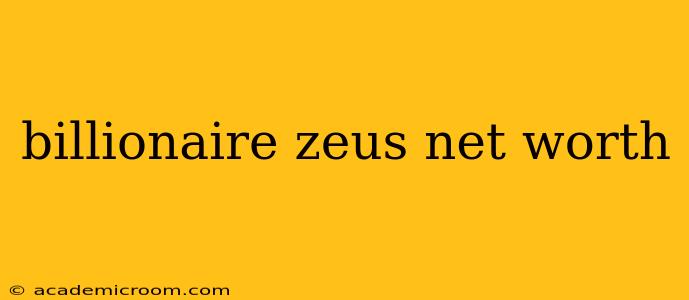The idea of a "billionaire Zeus" immediately conjures images of Olympian grandeur and unimaginable riches. While the Greek god Zeus wasn't exactly known for his bank accounts (his wealth was expressed in power, dominion, and divine attributes), exploring this concept allows us to delve into fascinating questions about wealth, mythology, and the enduring human fascination with power. This article will explore the mythical figure of Zeus, examine how the concept of a billionaire Zeus reflects modern societal values, and address some common queries surrounding this intriguing juxtaposition.
How Much Would Zeus Be Worth Today?
Estimating Zeus's net worth in modern terms is, of course, impossible. His "wealth" wasn't measured in dollars, euros, or any other currency. Instead, his power stemmed from his control over the sky, weather, thunder, lightning, law, order, and justice. He ruled the Olympian gods and mortals alike. To attempt a monetary valuation would be to completely misinterpret the nature of his power. However, we can explore the value of his influence and possessions, if we consider those in a modern economic framework.
His control over the elements alone translates to immense power, affecting agriculture, trade, and even warfare. His divine authority, the ability to dictate laws and dispense justice, would be equivalent to unparalleled political and economic control. If we were to assign a hypothetical net worth, it would be astronomical, far exceeding any earthly billionaire.
What Would a Billionaire Zeus Do With His Money?
This is where things get interesting. A hypothetical billionaire Zeus wouldn't hoard his wealth; his actions would likely reflect his mythological character. We can speculate that he might:
- Invest in grand infrastructure projects: Imagine temples, stadiums, and monumental structures that dwarf even the most ambitious modern constructions.
- Fund scientific research: Zeus's interest in power and knowledge might lead him to fund advancements in meteorology, energy, or even space exploration, attempting to replicate his divine powers.
- Champion social justice: Reflecting his role as a lawgiver, he might dedicate considerable resources to fighting injustice, inequality, and promoting societal harmony. However, his methods might be less democratic and more...divine.
- Indulge in extravagant displays of power: Let's be honest, some of his wealth would undoubtedly be spent on lavish parties, magnificent feasts, and the acquisition of rare and exotic artifacts.
Is There a Real-Life Equivalent to a Billionaire Zeus?
While no single individual mirrors Zeus's divine powers, modern figures with immense wealth and influence evoke parallels. Think of individuals who control vast industries, media empires, or even nations. Their capacity to shape global events and impact millions of lives echoes Zeus's power, albeit without the thunderbolts. However, this analogy is imperfect, as these figures are subject to earthly laws and limitations.
How Does the Concept of a Billionaire Zeus Reflect Modern Society?
The fascination with a "billionaire Zeus" highlights our ongoing preoccupation with power and wealth. It's a reflection of our modern society's tendency to equate financial success with ultimate power and achievement. The myth of Zeus, updated with a billionaire's label, represents both our awe and our anxieties about unchecked power, reminding us that even the most powerful figures are ultimately subject to various forces, be it divine justice or public opinion.
What Are the Strengths and Weaknesses of a Hypothetical Billionaire Zeus?
The hypothetical billionaire Zeus would possess unparalleled strength in terms of resource control and influence. However, he might suffer from the weaknesses often attributed to those with absolute power: hubris, a detachment from reality, and the potential for abuse of authority. His actions, driven by a divine (or perhaps egotistical) sense of purpose, could have both beneficial and devastating consequences.
In conclusion, the notion of a billionaire Zeus is a thought-provoking exercise, demonstrating how ancient myths can be reframed within a modern economic context. It highlights our enduring fascination with power, wealth, and the complex relationship between the two, while simultaneously reminding us of the limitations, and potential pitfalls, of unrestrained authority.
